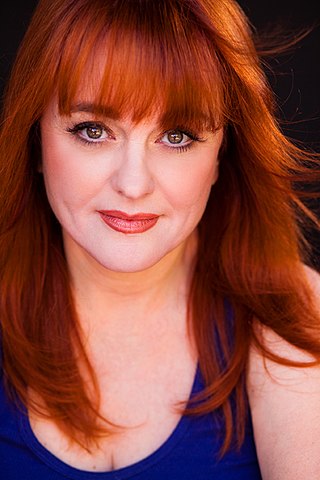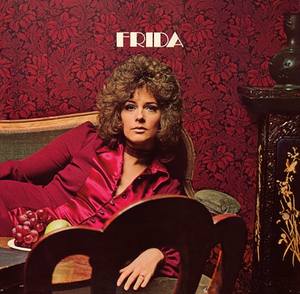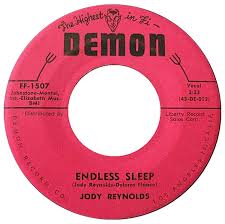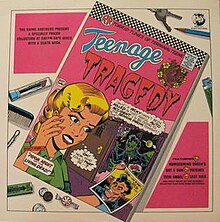
Julie Ann Brown is an American actress, comedian, screen/television writer, singer-songwriter, and television director. Brown is known for her work in the 1980s, where she often played a quintessential valley girl character. Much of her comedy has revolved around the mocking of famous people.

Kathleen Hanna is an American singer, musician and pioneer of the feminist punk riot grrrl movement, and punk zine writer. In the early-to-mid-1990s, she was the lead singer of feminist punk band Bikini Kill, and then fronted the electronic rock band Le Tigre in the late 1990s and early 2000s. Since 2010, she has recorded as the Julie Ruin.
Now That's What I Call Music! is a series of various artists compilation albums released in the United Kingdom and Ireland by Sony Music and Universal Music which began in 1983. Spinoff series began for other countries the following year, starting with South Africa, and many other countries worldwide soon followed, expanding into Asia in 1995, then the United States in 1998.

Muscle of Love is the seventh and final studio album by American rock band Alice Cooper. It was released in late 1973, the band played its last concert a few months later.

"The Homecoming Queen's Got a Gun" is a song by American singer–comedian Julie Brown. It appeared as the B-side to her 1983 single "I Like 'em Big and Stupid". Brown's satire of valley girl culture also parodies 1950s-1960s "teen tragedy" songs.
"Everybody's Trying to Be My Baby" is a rockabilly song often credited to Carl Perkins. Based on a 1936 song written by singer/songwriter Rex Griffin, it achieved widespread popularity when it was released in 1957 by Perkins and covered by the Beatles in 1964.
Norton Records is an independent record label founded by musicians Miriam Linna and Billy Miller in 1986. The label concentrates on rock, rockabilly, primitive music, punk, garage rock and early rhythm and blues. Most of its output, both new releases and reissues, is issued on vinyl.

Frida is the debut studio album by Swedish singer Anni-Frid Lyngstad, released in March 1971 by EMI Columbia. Recorded between September 1970 and January 1971, Frida was produced by her then-fiancé, Benny Andersson. Frida was her only album recorded for EMI during her contract, not counting her eponymous compilation album from 1972, before being signed to Polar and form with the Swedish pop group ABBA, a year later.

Goddess in Progress is a 1984 EP by Julie Brown, released on Rhino Records on 12" vinyl and cassette. The two tracks on side one first appeared on Brown's independently released 1983 single "I Like 'Em Big And Stupid"; and two of the three tracks on side two were later included on the soundtrack of Earth Girls Are Easy, a film starring Brown and Geena Davis and based on the song of the same name.

"Teen Angel" is a teenage tragedy song written by Jean Dinning and her husband, Red Surrey. It was performed by Jean's brother, Mark Dinning, and released in October 1959.

"Leader of the Pack" is a song written by George "Shadow" Morton, Jeff Barry, and Ellie Greenwich. It was a number one pop hit in 1964 for the American girl group the Shangri-Las. The single is one of the group's best known songs as well as a popular cultural example of a "teenage tragedy song". The song was covered in 1985 by the heavy metal band Twisted Sister, who had a more modest hit with their version.
A teenage tragedy song is a style of ballad in popular music that peaked in popularity in the late 1950s and early 1960s. Examples of the style are also known as "tear jerkers", "death discs" or "splatter platters", among other colorful sobriquets coined by DJs that then passed into vernacular as the songs became popular. Often lamenting teenage death scenarios in melodramatic fashion, these songs were often sung from the viewpoint of the dead person's sweetheart, as in "Last Kiss" (1961), or another witness to the tragedy, or the dead person. Notable examples include "Teen Angel" by Mark Dinning (1959), "Tell Laura I Love Her" by Ray Peterson (1960), "Ebony Eyes" by the Everly Brothers (1961), "Dead Man's Curve" by Jan and Dean (1964), and "Leader of the Pack" by the Shangri-Las (1964). The genre's popularity faded around 1965, but the hits from its heyday inspired a host of similar songs and parodies over the years.

"Dead Man's Curve" is a 1964 hit song by Jan and Dean whose lyrics detail a teen street race gone awry. It reached number eight on the Billboard Hot 100 singles chart and number 39 in Canada. The song was written and composed by Brian Wilson, Artie Kornfeld, Roger Christian, and Jan Berry at Wilson's mother's house in Santa Monica. It was part of the teenage tragedy song phenomenon of that period, and one of the most popular such selections of all time. "Dead Man's Curve" was added to the Grammy Hall of Fame in 2008.
Jimmy Cross, also known as Jimmie Cross, was an American radio producer and singer who attained a minor Billboard Hot 100 hit with the novelty song "I Want My Baby Back" in 1965.
The Goodees were an American pop music girl group who enjoyed brief popularity in the late 1960s. Formed in Memphis, Tennessee, the group is best known for the minor hit "Condition Red", a teen melodrama that bore a striking resemblance to the Shangri-Las hit "Leader of the Pack".

Archaeology is the second album by parody band The Rutles. Like their previous release, the album contains pastiches of Beatles songs.
The Rhino Brothers Present the World's Worst Records is a compilation album released by Rhino Records in 1983. It purports to compile the worst music ever recorded and features mostly novelty songs, parodies and cover versions of popular songs, performed very poorly. The original album included an airsickness bag and a warning that the album "may cause internal discomfort". Dr. Demento wrote the liner notes for the album.

"Endless Sleep" is a "teenage tragedy" pop song written and originally recorded by rockabilly singer Jody Reynolds in 1957.
Hullabaloo is a punk/grunge band from Cambridge, Massachusetts, started in 1986 by guitarist/vocalist Sluggo and vocalist/multi-instrumentalist TQ. The band cites myriad influences from John Coltrane to Iron Maiden and King Diamond contributing to their at times "surreal" and "psychedelic" sound. They also employed unusual instrumentation for a band of their ilk; TQ playing trumpet, tenor sax and electric piano in addition to vocals.

"Baby, Hold Me Close" is a song written by Jerry Lee Lewis and Bob Tubert and released as a single by Lewis in the U.S. in February 1965 on Smash Records. The song was also released in the UK in 1965 as a 45 single on Philips Records.











